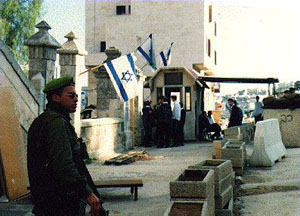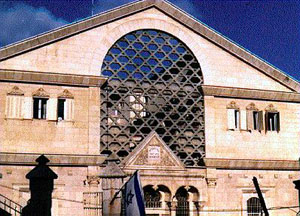
Left: Israeli soldier in the Jewish Quarter of Hebron.
It is appropriate to look at the history of this group of individuals. Unfortunately, it isn't that easy, as we have to wade through some very unsubtle semantics. So I gave up and decided on a look at how some of that history is presented. For reference, there are two Israeli Web sources available on the Diary's Hebron Redeployment index. Let's have a look at some of the semantics, starting again with the Israeli Ministry of Foreign Affairs as a source:
Hebron -- located south of Jerusalem in the Judean hills -- is home to approximately 120,000 Arabs, 500 Jews, and three Christians. An additional 6,000 Jews reside in the adjacent community of Kiryat Arba.The first thing that struck me about the opening paragraph was the "three Christians" mentioned. What have they got to do with anything? The section finishes with an almost identical paragraph (emphasis mine):
Hebron has approximately 120,000 (Sunni Muslim) Arab residents. Hebron's Jewish population, comprised of 45 Jewish families and around 150 yeshiva students, is about 500. Hebron's three Christian residents are the custodians of the city's Russian church. An additional 6,000 Jews live in the adjacent community of Kiryat Arba.Then I realised. The game being played here is a reversal of the argument I offered in the previous page, the argument that the city's population of 120,000 Palestinians is being forced to pander to the wishes of 400 individuals. In this scenario, the "three Christians" and the religion of "the Arabs" is introduced. This is a cunning tactic aimed at both Christian and liberal readers of the text. Later this is again underlined:
However, the restored Islamic (Mameluke) ascendancy was less tolerant than the pre-Crusader Islamic (Arab) regimes -- a 1266 decree barred Jews (and Christians) from entering the Tomb of the Patriarchs, allowing them only to ascend to the fifth, later the seventh, step outside the eastern wall.The Christian is being prodded in the text to sympathise for the two religious minorities living in an intollerant sea of Muslims. After all, the Christian is reminded, Christianity's origins lie in Judaism. There are "Jewish families" and "Arab residents" in this scenario, the former phrase very familliar to Christians. "People like us".
The liberal is being targetted in a similar but slightly different way, based more in the arena of politics and humanism than religious sympathy and best summed up by a headline from a Jerusalem Post editorial about Hebron of 15 November 1996 that read, "No ethnic cleansing". The plight of the Bosnian Muslims and the Rwandans has drilled the phrase into everyone's consciousness over the last few years in a million news reports.

Right: Beit Hadssah and Beit Hesed Le'Avraham, site of "an exhibition of the history of the Jewish community in Hebron and the museum in memory of the victims of the 1929 massacre of Jews in Hebron".
This is where we get into the real dynamics of the Jewish community's psychology in Hebron. Let us look at two consecutive paragraphs from the Israeli Foreign Ministry's text, almost as partisan as the settlers own website. Note both my emphasis and the shift from ancient to recent history:
Hebron is the site of the oldest Jewish community in the world, which dates back to Biblical times. The Book of Genesis relates that Abraham purchased the field where the Tomb of the Patriarchs is located as a burial place for his wife Sarah. According to Jewish tradition, the Patriarchs Abraham, Isaac, and Jacob, and the Matriarchs Sarah, Rebecca, and Leah are buried in the Tomb.Clearly Hebron is meaningful in the Jewish faith. Clearly the 1929 massacre was a crime against humanity. Yet the language emphasised above evokes a very different and a particularly Jewish meaning. We're back to "pograms", the Yiddish word referring to the organised Russian massacres of Jews. We're back to "free of Jews" or "Judenrein", the German word referring to one of the key goals of the Holocaust. Both words referring to two incomparably larger series of events in the Jewish consciousness.
Hebron has a long and rich Jewish history. It was one of the first places where the Patriarch Abraham resided after his arrival in Canaan. King David was anointed in Hebron, where he reigned for seven years. One thousand years later, during the first Jewish revolt against the Romans, the city was the scene of extensive fighting. Jews lived in Hebron almost continuously throughout the Byzantine, Arab, Mameluke, and Ottoman periods. It was only in 1929 -- as a result of a murderous Arab pogrom in which 67 Jews were murdered and the remainder were forced to flee -- that the city became temporarily "free" of Jews. After the 1967 Six-Day War, the Jewish community of Hebron was re-established. It has grown to include a range of religious and educational institutions.
These events should be important to Jews particularly, as time passes and revisionist historians increasingly find audiences who never lived the history easier to turn on to lurid Jewish conspiracy theories. Yet, these events do not apply to the reality of Palestine today. The Holocaust is precisely the kind of arguement that is a guarantee of unclarity in today's Arab-Israeli conflict, particularly in the case of Hebron. Why? Because the issue is not that Hebron's 400 Jews and 3 Christians need protection from tens of thousands of Muslims. It's the other way around.
The power dynamics that have existed in Hebron during the period of Israeli occupation (1967-1997) have clearly been in the favour of the State of Israel and its "representatives" in Hebron. The 12-day curfew only on Palestinian life after the February 1994 Hebron massacre of Palestinians, land confiscations, and the ridiculously biased partition plan for the Hebron Mosque are the kinds of examples of how misguided is this belief that Hebron's settlers are about to be massacred by Palestinians. Sure there are many Palestinians that would love to get their hands on a settler in a dark alley, but is this not the result of the humiliations experienced and witnessed on a regular basis from the IDF and settler population, rather than some unfathomable hatred of Jews in general?
Jerusalem Post journalist John Immanuel writes in a 17 January 1997 article, entitled "Sons of Abraham", that:"If the Holocaust influences the mentality of even the most liberal Israeli, Hebron Jews have pickled themselves in it... Settler relations with Arabs are inbued with deep distrust and contempt. Nowhere is this more evident than among the children. In Tel Rumeida, they live inches from each other, but it is obvious who is more indoctrinated against the other. It is always the Jewish child who rebuffs the Arab child that wants to play... Even if Zionism were viewed favorably by Hebron Arabs, they would still resent the overweening selfrighteousness among settlers they see in Hebron."Which brings it back to the issue of realities. Sure there are Palestinians in Hebron who are violently opposed to the presence of the settlement in their midst, but as Immanuel goes on to say:
"Few Hebron Arabs want them and fewer consider it reasonable that the IDF remain in control of 20% of the city just because 400 Jews choose to live there and not one kilometer up the road among 6,000 other Jews in Kiryat Arba."